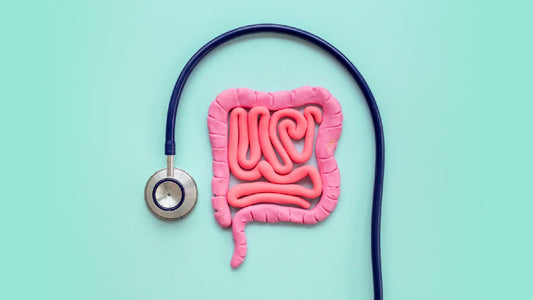Probiotic bacteria already exist in our body. So there’s a general assumption that probiotic foods and supplements are safe.
The primary reason for taking them is to improve our gut health.
Probiotics can help alleviate a range of digestive symptoms.
Yet within the first few days of introducing probiotics, some people experience adverse effects. These reactions can include stomach upset, gas, diarrhea, and bloating. Good gut bacteria play a crucial role in maintaining a balanced microbiome.
While these reactions are generally normal and temporary as the body adjusts, it still raises questions as to why this happens, how long it lasts, and if there is anything we can do to prevent it.
This article aims to answer all your questions about probiotics and their link to increased gas production and bloating.
What Are Probiotics?

Probiotics are living microorganisms, such as bacteria and yeast, that play an integral role in our gut microbiota. They’re found naturally in our gut, certain foods, and can also be taken as supplements.
You’ll find certain probiotic strains in fermented foods such as yogurt, tempeh, and kombucha. Specific strains like Bifidobacterium lactis HN019, Lactobacillus acidophilus Rosell-52, and Lactobacillus rhamnosus Rosell-11 are commonly found in these foods and supplements. They can also be supplemented in capsule, powder, or liquid form.
Probiotics are often referred to as the “good” or healthy bacteria found in our gut microbiota. These beneficial strains are essential for the smooth running of not only our digestive system but also for supporting a multitude of functions throughout the body.
Along with improved digestion, other health benefits associated with probiotics are boosted immune system function, and even improved mental health. So incorporating a probiotic supplement into your diet could be a smart thing to do.
What Can Probiotics Help With in the Gut Microbiome?

There is a plethora of research around the health benefits of probiotics and what they can do for your body. At the time of writing, there is still emerging research on the many functions of our gut microbiome, and it’s being proven by the year just how important this organ is for overall health and wellbeing.
Probiotics can also help manage digestive issues like acid reflux by balancing gut bacteria and improving stomach acidity.
Alongside these consistent findings, probiotics are also often in the limelight in the nutrition industry, claimed as a must-have in your supplement stack if you want to support overall health, particularly digestive health and immune system function.
Not only can probiotics support the healthy functioning of our body, but they may also help with some other gut-related conditions, such as:
-
Antibiotic Associated Diarrhea(1)
-
Constipation(2)
-
Inflammatory bowel disease (IBD)(3)
-
Irritable bowel syndrome (IBS)(4)
-
Lactose intolerance(5)
Where Can I Find Probiotics?

You can find probiotics in supplement form, but some foods are also rich in probiotics. So it's recommended you incorporate some of these into your diet.
In particular, fermented foods, such as yogurt, kombucha, kimchi, kefir, and pickles, are home to a host of good bacteria that benefit your body.
How Safe are Probiotic Supplements?
Probiotics are generally considered safe for most people. However, as with any supplement, it’s wise to consult with your healthcare provider before starting, especially if you have existing health concerns or conditions.
If you have a weakened immune system, it is particularly important to consult a doctor before including probiotics in your diet, as there may be a higher risk of infection or potential adverse reactions.
Specific Considerations for Vulnerable Groups
Because probiotics are live bacteria, individuals with certain health conditions may need to use caution when considering a probiotic supplement.
Those who are critically ill, have compromised immune systems, or anyone who has recently undergone surgery, should all check with their healthcare provider before taking any probiotic supplementation.
General Safety for Healthy Individuals
For most healthy individuals, probiotics are safe and won't cause any harm. They are a natural part of the gut flora and contribute to a balanced intestinal environment. Most side effects, if they occur, are mild and temporary and are just a case of your gut adjusting to the bacteria you're consuming.
What Are the Side Effects of Consuming Probiotics?

In healthy individuals, the side effects of probiotics are often minor and only affect a small percentage of the people that take them. Additionally, these side effects only tend to last for the first few days due to our microbiome adjusting to the new bacteria.
Some of the main side effects of probiotics include:
Headaches
Some individuals may experience headaches as a side effect of taking probiotic dietary supplements. This has been attributed to biogenic amines, which are produced by certain bacterial strains during the fermentation process.
Biogenic amines, found in popular fermented foods such as yogurt, sauerkraut, and kimchi, include substances like histamine, tyramine, tryptamine, and phenylethylamine. These compounds have the potential to excite the central nervous system and affect blood flow, leading to headaches in sensitive individuals.(6, 7)
Evidence suggests that the presence of biogenic amines in dietary supplements can impact individuals differently.
One study found that a low-histamine diet significantly reduced headaches in 75% of participants, but a review of ten controlled studies showed no significant effect of dietary amines on headaches.(8, 9) Given these mixed results, more research is needed to fully understand the relationship between biogenic amines and headaches.
General GI upset
Some people may experience digestive issues such as an increase in gas and bloating or constipation when they first begin taking probiotics. Specific probiotic strains, like Bifidobacterium lactis HN019 and Lactobacillus acidophilus NCFM17, can help alleviate these symptoms. This is largely due to the gut microbiome adjusting to the new bacteria. These side effects should subside within a week to two, depending on the individual.
Increased Histamine Levels
Certain probiotic strains found in supplements, such as Lactobacillus buchneri, Lactobacillus helveticus, Lactobacillus hilgardii, and Streptococcus thermophilus, are known to produce histamine within the digestive tract. which can often cause an allergic reaction. Therefore, if you suffer from histamine intolerance, it's normally recommended to thoroughly research the strains you are planning on taking to avoid any side effects.
Conclusion: Do Probiotics Cause Gas?
In conclusion, probiotics are beneficial bacteria that can help boost digestive health and function, improve immunity, and even improve mental health.
Having a good balance of bacteria in the gut can increase gut diversity, thus improving overall health and wellbeing.
Probiotics are safe to take for the majority of healthy people, though side effects can sometimes occur.
These side effects can occur in the first few days or weeks of taking a probiotic as a result of the gut microbiome adjusting to new bacteria. These side effects can range from bloating, gas, and constipation, to general GI upset, but these symptoms should pass.
The best way to ensure minimal side effects from taking probiotics is to start by taking a high-quality supplement, such as Performance Lab® Prebiotic, a 2-in-1 probiotic, and soluble fiber support for healthy metabolic and microbiome performance.
A prebiotic will nourish the good bacteria that already exists in your gut. Performance Lab® Prebiotic feeds your gut's existing microflora to promote healthy growth of beneficial bacteria - in harmony with your body.

SHOP PERFORMANCE LAB® PREBIOTIC
-
Blaabjerg S, Artzi DM, Aabenhus R. Probiotics for the Prevention of Antibiotic-Associated Diarrhea in Outpatients-A Systematic Review and Meta-Analysis. Antibiotics (Basel). 2017 Oct 12;6(4):21. doi: 10.3390/antibiotics6040021. PMID: 29023420; PMCID: PMC5745464.
-
Martínez-Martínez MI, Calabuig-Tolsá R, Cauli O. The effect of probiotics as a treatment for constipation in elderly people: A systematic review. Arch Gerontol Geriatr. 2017 Jul;71:142-149. doi: 10.1016/j.archger.2017.04.004. Epub 2017 Apr 14. PMID: 28467916.Martin VT, Vij B. Diet and Headache: Part 1. Headache. 2016 Oct;56(9):1543-1552. doi: 10.1111/head.12953. PMID: 27699780
-
Ghouri YA, Richards DM, Rahimi EF, Krill JT, Jelinek KA, DuPont AW. Systematic review of randomized controlled trials of probiotics, prebiotics, and synbiotics in inflammatory bowel disease. Clin Exp Gastroenterol. 2014 Dec 9;7:473-87. doi: 10.2147/CEG.S27530. PMID: 25525379; PMCID: PMC4266241.
-
Zhang T, Zhang C, Zhang J, Sun F, Duan L. Efficacy of Probiotics for Irritable Bowel Syndrome: A Systematic Review and Network Meta-Analysis. Front Cell Infect Microbiol. 2022 Apr 1;12:859967. doi: 10.3389/fcimb.2022.859967. PMID: 35433498; PMCID: PMC9010660.
-
Oak SJ, Jha R. The effects of probiotics in lactose intolerance: A systematic review. Crit Rev Food Sci Nutr. 2019;59(11):1675-1683. doi: 10.1080/10408398.2018.1425977. Epub 2018 Feb 9. PMID: 29425071.
-
Martin VT, Vij B. Diet and Headache: Part 1. Headache. 2016 Oct;56(9):1543-1552. doi: 10.1111/head.12953. PMID: 27699780.
-
Broadley KJ, Akhtar Anwar M, Herbert AA, Fehler M, Jones EM, Davies WE, Kidd EJ, Ford WR. Effects of dietary amines on the gut and its vasculature. Br J Nutr. 2009 Jun;101(11):1645-52. doi: 10.1017/S0007114508123431. Epub 2008 Nov 19. PMID: 19017420.
-
Jansen SC, van Dusseldorp M, Bottema KC, Dubois AE. Intolerance to dietary biogenic amines: a review. Ann Allergy Asthma Immunol. 2003 Sep;91(3):233-40; quiz 241-2, 296. doi: 10.1016/S1081-1206(10)63523-5. PMID: 14533654.
-
Wantke F, Götz M, Jarisch R. Histamine-free diet: treatment of choice for histamine-induced food intolerance and supporting treatment for chronic headaches. Clin Exp Allergy. 1993 Dec;23(12):982-5. doi: 10.1111/j.1365-2222.1993.tb00287.x. PMID: 10779289.














